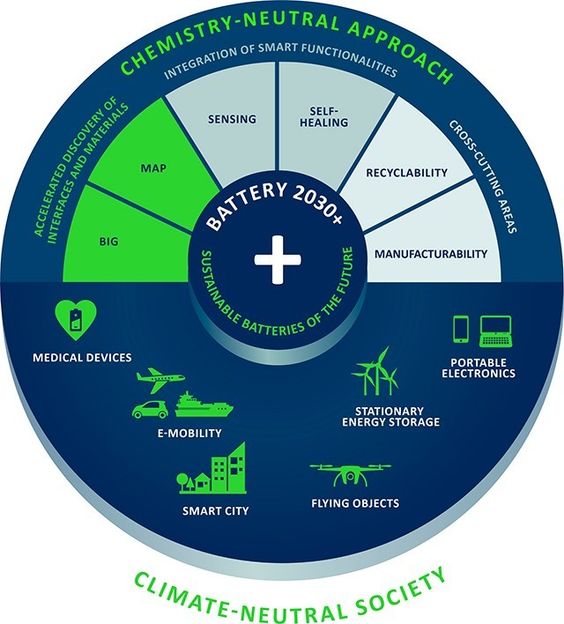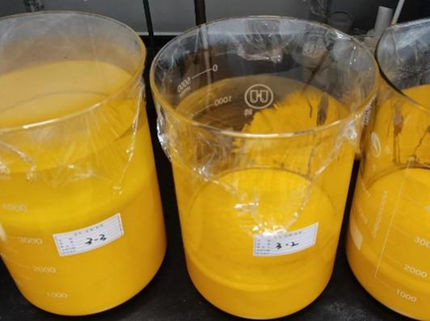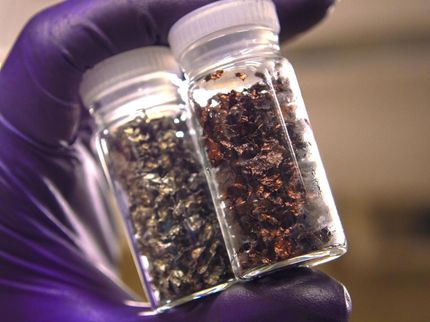Battery 2030+: Inventing the Sustainable Batteries of the Future
Advertisement
The European large-scale research initiative BATTERY 2030+ presents the long-term research roadmap that outlines the actions needed to invent the sustainable batteries of the future.

Holistic approach – European R&D roadmap Battery 2030+
© Battery 2030+
The transformation to a climate-neutral society requires fundamental changes in the way we generate and use energy. Batteries are a key enabler to reach this goal, if they can be made sustainable, safe and affordable with ultra-high performance at the same time. The Fraunhofer R&D Center for Electromobility at the Fraunhofer ISC in Wuerzburg has been involved in drawing up the European research and development roadmap for the BATTERY 2030+ initiative and coordinates the Fraunhofer-Gesellschaft's contributions to this EU research initiative. "We have been researching and developing new battery materials and technologies for over 25 years. We are currently contributing our material and manufacturing know-how to over a dozen national and European collaborative projects relating to battery development. For example, we are working on components for solid-state batteries and on modern, selective and efficient recycling processes," says Dr. Henning Lorrmann, head of the R&D center.
The initiative’s research roadmap has been developed through a European-wide consultation process and identifies three main research directions, based on a chemistry neutral approach, that will accelerate the development of the next generation of batteries.
“BATTERY 2030+ is not about developing a specific battery chemistry, but rather about exploiting the power of digital technologies like artificial intelligence for transforming the discovery and development process of our future smart and connected batteries. With BATTERY 2030+, battery design and development are entering the digital age”, says Kristina Edström, Director of BATTERY 2030+ and Professor of Inorganic Chemistry at Uppsala University.
Developing breakthrough technologies will require immense multi-disciplinary and cross-sectorial research efforts and approaches. Europe has the potential to take the lead thanks to thriving research and innovation communities.
“To invent the batteries of the future in Europe, we must join forces and find a coordinated, collaborative approach that unites industry, researchers, policy makers and the public behind a common vision that was laid out in the Battery Manifesto published a year ago”, says Simon Perraud, Deputy Director of BATTERY 2030+ and Deputy Director at CEA-Liten. This is to be achieved through sustainably degraded materials, greater material resource efficiency and smarter functions, more environmentally friendly scalable manufacturing processes for affordable battery solutions, and more efficient recycling and remanufacturing processes.
The three major research themes identified in the roadmap are:
- Accelerated discovery of interfaces and materials
- Integration of smart functionalities
- Manufacturability and recyclability as cross-cutting areas
Theme I: Accelerated discovery of interfaces and materials
BATTERY 2030+ will build a Materials Acceleration Platform (MAP) that will redefine how we do battery materials research today. This will be achieved by combining powerful approaches, from high-throughput synthesis and characterization as well as materials computation, automated data analysis, data mining, and artificial intelligence.
Building on the Materials Acceleration Platform, BATTERY 2030+ will develop a Batteries Interface Genome (BIG) that will lay a new basis to our understanding of the processes that govern the functioning of every battery. Understanding and tailoring the mechanisms that determine whether batteries will be safe and have a long lifetime is key to inventing the battery of the future.
Theme II: Integration of smart functionalities
Even the best battery will fail eventually. External factors, such as extreme temperatures, mechanical stress, excessive power during operation or simply ageing over time, will act detrimentally on battery performance. Therefore, we must find new ways to prevent batteries from failing.
Sensing: In the battery of the future, we will follow chemical and electrochemical reactions directly inside a battery cell. New sensor concepts that can discover early stages of battery failure and unwanted side reactions leading to early battery ageing will emerge.
Self-healing: Clever ways of healing damage inside a battery that otherwise would lead to battery failure can make batteries safer, more reliable and more sustainable. This will become an important property of batteries of the future.
Theme III: Cross-cutting areas
Manufacturability and recyclability of batteries are thus key cross-cutting areas that will develop in parallel with Theme I and II. The new knowledge and ideas on how to manufacture and recycle the batteries will from the start feed into the materials discovery and development process. This ensures that all research approaches lead to new batteries that can actually be produced and recycled, not only cost-effective but also as climate-neutral as possible.
Other news from the department science
Most read news
More news from our other portals
See the theme worlds for related content
Topic World Battery Technology
The topic world Battery Technology combines relevant knowledge in a unique way. Here you will find everything about suppliers and their products, webinars, white papers, catalogs and brochures.

Topic World Battery Technology
The topic world Battery Technology combines relevant knowledge in a unique way. Here you will find everything about suppliers and their products, webinars, white papers, catalogs and brochures.






























































